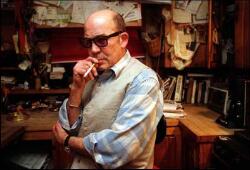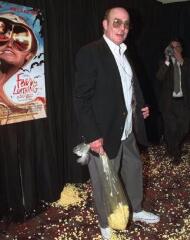"When the Going Gets Weird..." - Hunter S. Thompson 1937-2005
by j.d. lafrance

"We were somewhere around Barstow, on the edge of the desert, when the drugs began to take hold..." I can't remember when I first read those words - the first line from Fear and Loathing in Las Vegas - but I do know that it was during those formative years when it, Catcher in the Rye and On the Road formed the holy trilogy for me. They were books that I read all the way through at a furious pace, absorbing every word and every image. They changed my life forever. Fear and Loathing was particularly memorable for its wicked sense of humor and the way it gleefully thumbed its nose at stuffy straight society. And that was particularly attractive to someone at a young age when they feel very adversarial towards the rest of the world. In that respect, Hunter's words spoke to me in a very profound way.
After reading Fear and Loathing I wanted more and sought out his other notable works - Hell's Angels and Fear and Loathing: On the Campaign Trail '72. Both are brilliant in their own ways but I kept coming back to Las Vegas. Then, when I heard that one of my favorite filmmakers, Terry Gilliam, and one of my favorite actors, Johnny Depp, were going to be filming an adaptation of Fear and Loathing in Las Vegas, I was ecstatic. They were the perfect choices to transfer Hunter's warped vision to the big screen. The film did not disappoint. It and Hunter's words would play a major factor in me meeting my future wife.
I have been pouring over the numerous tributes to the man in past few days, thinking about what I would say. I do not intend to dwell on the morbid details of his demise. I want to celebrate his life and his work.
Hunter was born in Louisville, Kentucky on July 18, 1937. During a two year stint in the Air Force he worked as a sports reporter for the base newspaper. There were two significant pre-occupations that were constant subjects in his writing: sports and politics. They were forever intertwined in his work, like when he interviewed Richard Nixon in 1968 but only if they would talk about football.
His first book, Hell's Angels, was an inside look at the infamous biker gang and resulted in Hunter getting stomped by some bikers for his troubles. It was published in 1966 and established him as one of the shining new stars of the New Journalism movement of the '60s that included Tom Wolfe, but he refused to be pigeon-holed and carved out with his own unique vision.

The origins for his most famous work - Fear and Loathing in Las Vegas - started off quite humbly. Hunter was assigned to write captions for a photo-essay on the Mint 400 off-road motorcycle race in Las Vegas for Sports Illustrated magazine. Along for the ride was his attorney, Oscar Zeta Acosta, whom he had met through a mutual friend. At some point, the editor for Rolling Stone magazine heard that Thompson was in Vegas and asked him to also cover the National District Attorneys Association's Third Annual Conference on Narcotics and Dangerous Drugs which was being held at Caesar's Palace.
When Sports Illustrated rejected his work, Hunter took the Rolling Stone gig. It was at this point that he began to put his weird journey on paper. Acosta had inspired Hunter to take his writing to a new level where the journalist participates in the story he is writing about. Hunter had crafted his own distinctive writing style, dubbed "gonzo journalism," that was as much about getting the story as it was reporting on the story itself. Objectivity was thrown out the window in favor of a highly personal form of reporting. The term "gonzo," as it pertained to Hunter's writing, was coined by fellow journalist Bill Cardoso who commented that Hunter's article on the Kentucky Derby was "pure gonzo."
Fear and Loathing in Las Vegas was first published in Rolling Stone magazine in 1971. Hunter invented the Raoul Duke moniker because he was worried that his debauched misadventures depicted in the book might ruin his chances of acquiring press credentials from the White House so that he could cover the 1972 Presidential campaign - hence the Duke byline. He got his credentials and allowed the book publishers to use his real name when the story (his attempt to get an interview with then President Nixon) was released in book form in 1972.
He was unafraid to savage politics and politicians (both Democrats and Republicans), recently calling George W. Bush a "treacherous little freak." In Campaign Trail '72, Hunter described working for Democratic front-runner Senator Ed Muskie as "something like being locked in a rolling box car with a vicious 200-pound rat," and Nixon as "America's answer to the monstrous Mr. Hyde. He speaks for the werewolf in us."
In 1970, Hunter ran for sheriff of Aspen as the Freak Power candidate and lost by only a handful of votes after campaigning for the legalization of drugs and for Aspen to be renamed Fat City. His Republican opponent had a crew cut so Hunter shaved his head and constantly referred to him as "my long-haired opponent."
Hunter was immortalized in film first by Bill Murray in the cinematic misfire known as Where the Buffalo Roam (1980) and by Johnny Depp in the warped masterpiece, Fear and Loathing in Las Vegas (1998). Hunter was also the inspiration for Uncle Duke, right down to his trademark aviator sunglasses and cigarette holder, in Garry Trudeau's popular comic strip, Doonesbury. Hunter was not always crazy about how he was portrayed by others, infamously threatening to disembowel Murray the next time they met and claimed that he would set Trudeau on fire. Over the years he made peace with both men.
Known mostly for his savage journalism, Hunter also wrote a wonderfully romantic, almost nostalgic novel called The Rum Diary in 1959 but it was not published until 1998. The book was a fictionalized account of his stint writing for a small newspaper in Puerto Rico after he had been fired from Time magazine.
In his later years, Hunter stayed close to his home base - a "fortified compound" in Woody Creek, not far from Aspen, that featured a shooting range that he used regularly with his impressive arsenal of guns. He became more of a cult figure appearing in the occasional documentary (one of the best being Breakfast with Hunter) or on Charlie Rose or Conan O'Brien to push his latest book.
Hunter and his work will always hold a special place in my heart. He was a true original, to quote his own prose, "One of God's own prototypes. Some kind of high powered mutant never even considered for mass production. Too weird to live, and too rare to die." I will miss him very much.
Copyright © 2005 erasing clouds |
|